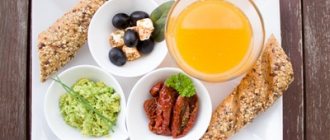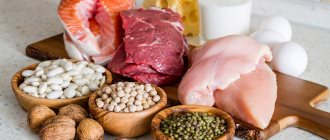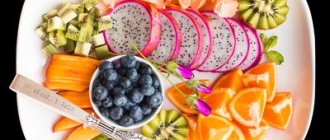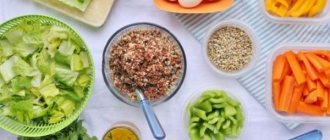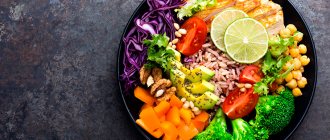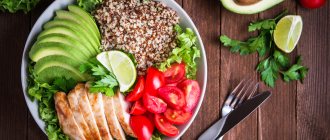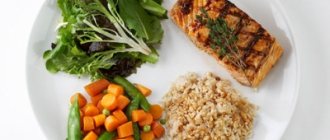Maintaining a balanced diet is not a diet, but a rule of life, that is, you should always eat right, and not just a couple of weeks a year. The consequences of an unhealthy diet are obvious:
- diseases of the cardiovascular system;
- hormonal imbalances;
- diseases of the gastrointestinal tract, kidneys and liver.
An incorrect diet is especially harmful for children, jeopardizing their future health. Therefore, not one person, but the whole family must switch to proper nutrition.
Getting rid of bad habits
Is it worth reminding us how much our beauty and health suffer from addictions? Smoking causes problems with the skin, teeth, throat, blood vessels, lungs, stomach... Frequent consumption of alcohol destroys the nervous system and increases appetite, forcing a person to “snack” beyond measure, gaining excess weight. Over time, computer games become highly addictive, dull, and lead to poor vision and poor posture. So is it worth risking the most valuable thing - your health - for the sake of dubious pleasure?
What is a healthy lifestyle?
In the generally accepted understanding, a healthy lifestyle is understood as a set of measures aimed at preserving and maintaining physical, mental and emotional health. Most experts agree that a healthy lifestyle includes:
- balanced diet;
- moderate physical activity;
- mental hygiene;
- rejection of bad habits.
However, a lot of pseudoscientific data has appeared about a healthy lifestyle, promoted by people far from medicine. It is important for a person who decides to adhere to a healthy lifestyle to understand that it is necessary to follow the recommendations developed by qualified doctors: nutritionists, therapists - only in this case can one achieve good results and not harm one’s health.
Forming a “positive image”
A simple but very effective way to improve your health is to look like a healthy and successful person. Doctors' advice will not help you with this. Only self-confidence and control of your appearance will bring good results. You will see changes very quickly if you follow these conditions every day:
- Keep your back straight and your chin high.
- Make sure your shoulders are back.
- Smile.
- Dress to please yourself.
- Do not communicate with people who complain a lot and talk about illnesses.
The basics of healthy eating - the path to longevity
Home » Medical prevention » The basics of a healthy diet - the path to longevity
Ministry of Health of the Astrakhan Region
GBUZ JSC "Center for Medical Prevention"
«BASICS OF HEALTHY EATING - THE PATH TO LONGEVITY"
Healthy nutrition is nutrition that ensures human growth, normal development and vital activity, promotes health and prevents diseases. By eating right today, you take care of your health for many years. Healthy nutrition is one of the elements of a healthy lifestyle and the most important components of beauty and health. Sticking to a healthy diet isn't that difficult. Start switching to a healthy diet gradually. If you adhere to the basic rules of a healthy diet, then most diseases will bypass you, and your spirits and energy will never run out.
Basic rules of healthy eating
- It is necessary to ensure that the caloric content of the diet corresponds to the energy expenditure of the body and monitor body weight.
- Your food should contain all the substances necessary for a full life: proteins, carbohydrates, fats, vitamins, mineral salts and trace elements, i.e. nutrition should be varied and properly balanced.
- Eat calmly, in small pieces and chew each piece well.
- Divide your daily diet into 4-5 small meals (about 1 glass), instead of 2-3 large meals.
- Do not consume (or minimize the consumption of) harmful foods such as mayonnaise, ketchup, fast food, alcohol, etc.
- Limit the consumption of simple carbohydrates (sugar, sweet carbonated drinks) - no more than 30-40g per day. In some cases, sugar can be replaced with honey.
- Limit your salt intake. Use iodized salt instead of regular salt.
- Eat more fresh vegetables and fruits. Aim to include whole grains, legumes and nuts in your daily diet.
- Drink about 2 liters of water per day. Do not drink with food or drink immediately after meals (drink 30 minutes before meals and 30 minutes after meals). Do not drink a lot of water at night - no more than 200 ml.
- Have dinner no later than 4 hours before bedtime. About 2 hours before bedtime, you can drink a glass of low-fat kefir, yogurt or yogurt.
Body weight is the main indicator of energy balance. Energy needs depend on your type of activity and overall physical activity. You can determine whether your weight is normal using your body mass index (BMI). To calculate your BMI, you need to divide your weight in kilograms by the square of your height (kg/m2) .
- If the BMI value is from 18.5 to 25, then your weight is normal, which means you are consuming enough calories.
- BMI less than 18.5 – underweight. This can lead to exhaustion of the body and disruption of the functioning of all organs; it is worth increasing the amount of food consumed.
- A BMI from 25 to 30 is a sign of being overweight. It is urgent to reduce portions and increase physical activity, otherwise you risk obesity.
REMEMBER! An adult can rely on BMI.
A child's underweight or overweight must be diagnosed by a doctor!
Cooking healthy food
Whether food is healthy depends largely on how you prepare it. From the same products you can prepare both healthy and unhealthy food. The whole secret is in the balance of ingredients, breaking up meals, and cooking methods. Don't say that you don't like something - just try preparing this product differently!
When preparing dishes, use only vegetable oils (sunflower, olive, etc.) and gentle heat treatment (steam, grill, bake, boil, stew without adding oil).
Healthy Plate Principles
- 20% - fresh fruits or berries;
- 25% - grains or legumes;
- 25% - sources of healthy protein
- (meat, fish, seafood, eggs, cottage cheese);
- 30% - vegetables (fresh vegetable salad or vegetable stew);
- 200-250 ml – drink (water, tea, juice).
The basis of the diet consists of vegetables (except potatoes), fruits, grains and legumes, the amount of which should not be less than 500g. per day. In order to increase the amount of dietary fiber (fiber) in the diet, it is recommended to consume baked goods made from whole grains, as well as with the addition of bran.
PROTEINS are the most important components of food. Proteins of plant and animal origin should be present in food in equal proportions, approximately 30-40g. some and as many others.
Animal proteins ( meat, fish, cottage cheese, eggs, cheese) contain about 20% pure protein. The daily intake of such products should be up to 150-200g. Red meat (lamb, beef, pork) is not recommended to be consumed more than twice a week; it is better to replace it with chicken, turkey (without skin), and even better - fish.
Plant proteins (grain products, cereals, legumes, mushrooms, sunflower and pumpkin seeds and nuts). Eat 1 serving of these products per day: you can prepare a separate dish or add them to any other dish (salad, omelet, vegetable side dish, soup, etc.).
CARBOHYDRATES – supply the human body with energy. Proteins are divided into simple and complex. Our body needs them the most, as they serve as the main source of energy.
Simple carbohydrates (sugar, sweets and drinks based on it), they require no more than 50g per day.
Complex carbohydrates are present in starchy foods (bread, cereal, pasta, as well as vegetables and fruits). A healthy person needs to consume 350g of carbohydrates per day.
FATS – have high energy value. They are more than 2 times higher than the energy value of proteins and carbohydrates, which means that foods containing fat are the most high-calorie.
Animal fats (saturated), high consumption leads to obesity, diabetes and cardiovascular diseases. It is recommended to limit the consumption of fatty meat, butter, as well as the exclusion of meat and sausage products (sausages, sausages, carbonates, etc.) and offal (liver, tongue, etc.).
Vegetable fats (unsaturated ) enter the body along with vegetable oils - olive, soybean, sunflower or corn. 1-2 tbsp is enough. spoons of this oil per day (30g).
It is IMPORTANT that your daily diet should include:
proteins – 15%, fats – 30%, carbohydrates – 55%.
FOOD FIBER is practically not digested. However, they significantly affect the processes: digestion, absorption of food, and are also important for the intestinal microflora. Dietary fiber is found in vegetables and fruits, unrefined grains such as rolled oats, and bran.
LIMIT CONSUMPTION OF TABLE SALT to 5g, i.e. 1 teaspoon. It is necessary to limit/eliminate the consumption of canned products, pickled and salty foods, and you should also abandon the habit of adding salt to an already prepared dish.
Alcoholic drinks should be limited/excluded from the diet, since they do not contain nutritional value for the body.
MONITOR YOUR HEALTH, EAT VARIOUSLY.
HEALTHY EATING – HEALTHY LIFE
The material was prepared by the preparation and replication department
medical information materials of the State Budgetary Healthcare Institution JSC "CMP" - 2020
Making your own menu
Let's move on to planning your meals. We hope that we have convinced you of the need to have a variety of products on your table. Now let's try to figure out how to eat properly - how often and in what quantities should one or another product or dish be included in the daily diet. Main food groups and recommended amounts for their consumption:
| Product group | Essential Nutrients | Recommendations |
| Bread, cereals and potatoes | Simple and complex carbohydrates, protein, fiber, B vitamins | Consume every day, preferably at every meal, give preference to products made from unrefined grains or containing bran. |
| Vegetables and fruits | Simple and complex carbohydrates, fiber, vitamin C, carotenoids, folic acid, many biologically active substances | Use in any form 5 or more times a day. Eat at least 400 grams of raw or cooked vegetables and fruits daily. |
| Meat, poultry, fish, eggs and legumes | One of the main sources of protein, an easily digestible form of iron, vitamin B12 | Include in your daily diet in the amount of 120-150 g in prepared form in 1-3 meals. Try to reduce the number of eggs to 3-5 per week. Don't forget about legumes - they are a healthy and affordable source of protein. |
| Dairy | The only significant source of calcium, contains protein, B vitamins, vitamin D | Consume up to 500 ml of milk, 50-100 grams of cottage cheese and cheese per day. Choose low-fat dairy options. |
| Fats | Vegetable oils and fish oil are sources of polyunsaturated fatty acids and vitamin E. | Polyunsaturated fatty acids provide prevention of cardiovascular diseases. 1-2 tablespoons are needed for dressing vegetable salads. Try to reduce the amount of fat you use in cooking. Reduce the use of animal fats to a minimum. |
| Sugar and confectionery | Simple carbohydrates, saturated fats | Contribute to the development of obesity, diabetes, cardiovascular and other diseases! Consume them in limited quantities and only if all the other foods listed above are present in your diet. Reduce your daily sugar intake to 50 grams. |
Bistro
The second stage of “Bistro” allows you to lose 3.5–5 kg in 3 weeks. It's pretty fast because the diet is very strict. It reduces appetite, but is difficult to follow for a long time, so it is intended for a maximum of 3 weeks, after which you need to move on to the “Gourmet” phase for 1 month. If after this month you have not yet reached your goal weight, continue alternating weeks on the Bistro and Gourmet plans until you reach your goal weight.
Also use the Bistro diet menu:
- within 7 days, if during the “Gourmet” stage your weight has stopped decreasing;
- for 2 weeks if you find it difficult to stick to the Café plan;
or
- within 2-3 days if you gain a few kilos after you reach your correct weight. During the Bistro phase, you should take a multivitamin and magnesium to avoid fatigue and cramps, and drink plenty of fluids throughout the day.
Feel free to adapt the recipes by replacing some products with others from the list of equivalents (at the end of the article) to suit your taste.
The Bistro Stage will help you lose weight quickly while eating enough to avoid fatigue. For breakfast, you can eat low-fat yogurt without additives or sugar, but if you want, add a sweetener or use an equivalent product instead of yogurt. For example, a glass of milk or other low-fat dairy product.
In addition, it is recommended to drink unlimited amounts of water, as well as black coffee, tea or herbal infusions (with sweetener instead of sugar) or low-fat vegetable broth, which is rich in minerals and vitamins and suppresses appetite.
You can add as many seasonings, herbs, lemon juice and fat-free bouillon cubes to your meals to enhance the flavor of vegetables and other low-fat foods. But do not add fat and oil when cooking vegetables, meat and fish. It is also recommended to diversify the choice of cheeses and vegetables: you will introduce novelty and variety into your diet so that the weight loss diet does not become too monotonous and your taste buds adapt more easily.
Recommendations for creating a balanced diet
Absolutely anyone can leave bad habits in the past and switch to proper nutrition, the main thing here is desire. If you follow simple tips and recommendations, the process can go unnoticed, which is what we strive for.
- You can’t abuse your body by starving. Giving up food completely or minimizing it as much as possible will not bring you anything good. If you are hungry, eat an apple, a handful of nuts or dried fruits.
- You should drink a lot, but not necessarily plain water. There are a large number of healthy drinks, for example natural juices, green or herbal tea, chicory, compotes without sweeteners.
- The more varied the diet, the wider the list of dishes that you regularly prepare, the easier the process of transition from habitual to healthy eating will be.
- Choose natural over super-processed foods. It is better to choose a piece of meat rather than sausages, as well as fresh tomatoes, leaving canned ones until better times. It is better to always follow these criteria.
Don’t forget that if you really want something, it’s better to eat it for breakfast than to suffer and torment yourself. Excessively strict prohibitions sometimes lead people to annoying breakdowns, which can negate all previously made efforts. Therefore, if you want a piece of unhealthy cake, it is better to eat it before lunch to minimize the harm and calm down, rather than walk around it like a predatory shark around a small fish.
Healthy lifestyle nutrition menu for the week: universal template
Many people want to adhere to the rules of PP, but can’t figure out where to start. First, you should calculate how many calories your body needs for normal functioning. In addition, you can create a menu using a universal template that can be varied from day to day.
Breakfast
It should be rich in carbohydrates, which give an energy boost for the whole day.
- Cereals (oatmeal, quinoa, rice).
- Muesli or bread.
- Unsweetened yogurt, kefir or fermented baked milk.
- Hard or soft cheese.
Lunch
Between breakfast and lunch, you need a light snack, which can be had at about ten o'clock in the morning.
- Any fruit weighing from one hundred to two hundred grams.
- A handful of nuts or seeds.
- Dried fruits.
- Cottage cheese or yogurt.
Dinner
This meal should be the most satisfying, which makes it the main meal.
- Porridges of various types (buckwheat, brown or brown rice), pasta made from durum wheat.
- Vegetables.
- Boiled or baked meat.
- Fish or seafood.
- Vegetable salads.
Afternoon snack
After lunch, it is difficult to endure until the evening, especially if you eat healthy foods, which for the most part do not give a long-term feeling of fullness. Therefore, you can “stick” another one between them.
- Small fruit.
- A glass of natural juice.
- A handful of nuts or seeds.
Dinner
According to an old saying, dinner should be given to the enemy, but this is a very controversial statement. A light, tasty dinner two hours before bedtime will help you get rid of the obsessive feeling of hunger.
- Boiled or baked poultry.
- Rabbit, beef.
- Fish or seafood.
- Legumes.
- Salad made from vegetables that contain a lot of fiber: carrots, cabbage.
Having such a template guide, you can make a list of dishes for the week in advance so that the meal plan does not seem bland and monotonous.
How to Instill Healthy Eating Habits
Before you start switching to proper nutrition, ask yourself why you are doing it in the first place. Answer quickly and be honest with yourself. Only the truth will allow you to understand and help yourself form the right eating habits. The priority in such cases is the issue of the general condition of the body; only health can motivate incredible achievements and victories.
- Keep a food diary where you make any changes in your diet. It doesn’t hurt to write down your feelings, mood and other factors that can help you analyze your behavior. There are options for programs for the phone, they are also very functional, but the old fashioned way, with pen on paper, you can still write down much more useful information.
- You cannot suddenly switch to PP. It is worth giving yourself the opportunity to gradually get used to it, for which healthy new dishes will have to be introduced in stages.
- Keep in mind that boring, monotonous food will definitely lead to a breakdown. It’s good if you start again after it, because some people lose interest in PP forever. This can lead to various diseases, and we do not need this at all. Let your menu be varied; ideally, you will have to learn how to cook. But this is a small sacrifice for longevity, health and beauty.
- Forget about strict diets and severe food restrictions, as these too can quickly cause you to give up on your attempts to become healthy.
- Avoid eating out as you cannot be sure of the quality of the food served to you. And the risk of ordering something harmful, but so desirable and tasty, will then be reduced to zero.
- From now on you will only go to the store on a full stomach. This is one of the rules for facilitating the formation of true food attachments. A hungry person will easily fall for the bright packaging of something extra, so this is out of the question, you must be completely full.
- Use the achievements of modern science and technology, set reminders on your phone for drinking water, eating patterns and other necessary things.
- Sport is a good continuation of proper nutrition. Only by leading an active lifestyle can you remain strong, beautiful, and fit for many years. In addition, according to scientific research, physical education helps to form correct eating habits faster and easier.
It would be nice to find like-minded people. In the company of people who think exactly like you, it is much easier to overcome difficulties. It's good if you have the support of your family, friends and loved ones. If not, you will have to look for people like you in hobby clubs, fitness rooms and other similar places. You should also not pay attention to attacks, ridicule or unfounded criticism, which often prevent a person from developing the right habits. Learn to firmly say “No!”, and calmly continue doing your job, then your life will become much easier.
